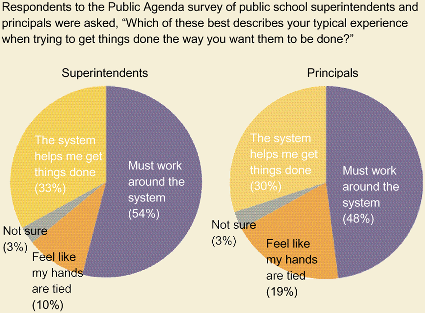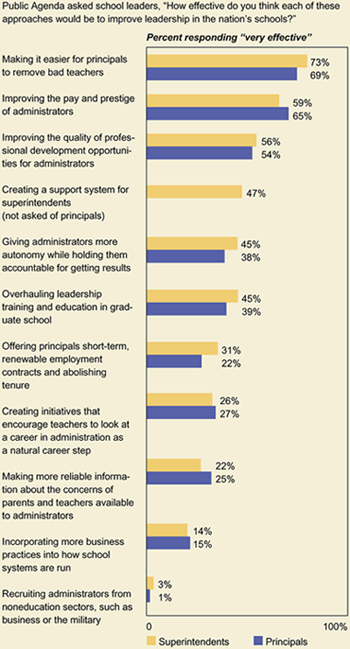I will be retiring this year after 35 years in the business,” said one discouraged public school superintendent interviewed by Public Agenda. “I am tired of . . . dancing around the political games.”
Politics, bureaucracy, paperwork, and dustups with parents, unions, and special interests—these are some of the frustrations that bedevil today's school superintendents and principals, according to an in-depth study conducted by the nonprofit, nonpartisan research and education organization Public Agenda for the Wallace-Reader's Digest Funds. Public Agenda surveyed 853 public school superintendents and 909 public school principals about the challenges they face and what might help them do their jobs better.
Challenges of Leadership
The superintendents and principals responded to questions on a broad range of topics, including academic standards, funding, professional development, pay, and related personnel issues. Politics and bureaucracy repeatedly topped the leaders' list of complaints.
Bureaucracy and Red Tape
Eight in 10 superintendents (81 percent) say that politics and bureaucracy are the main reasons that colleagues leave the field. Problems such as low pay (5 percent) or the pressures of higher standards (10 percent) do not even come close. More than half of school superintendents (54 percent) say that they need to “work around the system” to get things done. Ten percent say that the system actually ties their hands (see fig. 1).
Figure 1. Working Around the System

Source: Public Agenda. (2001). Trying to stay ahead of the game: Superintendents and principals talk about school leadership. New York: Author. No reproduction/distribution without permission.
Cumbersome procedures, onerous paperwork, demanding parents, and grumbling teachers combine to take their toll. Sixty-nine percent of superintendents say that the school board sometimes interferes with their ability to do their job. Half of superintendents say that legal issues (50 percent) and complaints from parents and special interests (48 percent) take up too much of their time. Almost as many (43 percent) say that issues related to the unions and collective bargaining are time-consuming.
Overwhelming Workload
Principals have their own complaints. More than half of them (57 percent) maintain that even good administrators in their district are “so overwhelmed” by day-to-day activities that their ability to “provide vision and leadership is stymied.” One principal interviewed for the study said, “My desk is never clear of obligations. . . . Constant interruptions from parents, teachers. . . . Principals do not have a lunch hour.” Another, a former classroom teacher, painted a similar picture:I loved teaching and thought I could make a difference as a principal. But . . . the job is not what I expected. I spend all my time being a business manager hoping no one gets upset—either teacher or parent—[because] generally there is little support.
Money and Mandates
Both superintendents (66 percent) and principals (53 percent) respond that insufficient funding is a pressing problem in their districts. In particular, superintendents worry about federal and state mandates that compel schools to offer certain services. Almost 9 in 10 superintendents (88 percent) complain that they receive mandates “without getting the resources necessary to fulfill them.” Almost as many of them (84 percent) say that they have to use a “disproportional amount of money” for special education. Yet just 18 percent of superintendents and 13 percent of principals say that lack of funding is such a crucial problem that only minimal progress can be made. Most—73 percent of superintendents and 72 percent of principals—believe that insufficient funding is a problem, but that they can make progress with what they have.
Lack of Control
More frustrating for most school leaders is a lack of authority and control over the schools they are expected to manage. By overwhelming majorities, both superintendents (92 percent) and principals (89 percent) say that giving them “far more autonomy to run the schools” while still holding them accountable for results would be a “somewhat effective” or “very effective” way to improve schools.
Testing and Accountability
Many principals voice some unease about the increasing use of students' standardized test scores to judge principal and school performance, although most superintendents (67 percent) believe that it is a good idea to hold principals accountable for their students' test scores. Some principals say that standardized tests are poorly used in their own district (25 percent); others contend that the tests themselves are “seriously flawed measure[s] of student achievement—we use them because there's no choice” (30 percent). More than 4 in 10 (44 percent) say that talented colleagues are being driven out of the field because of “unreasonable standards and accountability.” As one principal interviewed for the study put it, “Accountability is great, but schools should not be judged by what students do on one test on one day in March.”
The Trouble with Tenure
When it comes to disciplining students or purchasing supplies, most school leaders say that they are comfortable with the level of authority that they now have. But fewer than one-third say that they have enough freedom to remove ineffective teachers or to reward outstanding ones. In fact, relaxing teacher tenure is at the top of a list of 11 different ideas respondents judged “very effective” for improving school leadership—ideas ranging from improving administrator pay to revamping leadership education and training (see fig. 2). About 7 in 10 school leaders say that “making it much easier for principals to remove bad teachers”—even those who have tenure—is a “very effective” way to improve leadership in the nation's schools.
Figure 2. Ways to Improve School Leadership

Source:Public Agenda. (2001). Trying to stay ahead of the game: Superintendents and principals talk about school leadership. New York: Author. No reproduction/distribution without permission.
The Leadership Pipeline
Eighty percent of superintendents and 69 percent of principals believe that leadership programs in graduate schools of education are “out of touch” with the realities of running schools today. Sixty percent of superintendents and 66 percent of principals say that too much of the professional development they are offered is “impractical and focuses on the wrong things.”
Superintendents also voice a number of concerns about the performance of principals in their district and some skepticism about the talent pool available to fill jobs. Only about one-third of superintendents say that they are “happy” with the ability of their district's principals to recruit talented teachers (36 percent), make tough decisions (35 percent), delegate responsibility and authority (34 percent), involve teachers in decisions (33 percent), and use money effectively (32 percent). In fact, most superintendents (65 percent) are “happy” with the principals in their district on only one measure out of the 13 covered: “putting the interests of children above all else.” Sixty percent of superintendents agree that “you sometimes have to settle and take what you can get” when hiring new principals.
Implications for Schools and Districts
What do the results of this Public Agenda survey mean for educators and others grappling with the challenges of providing strong leadership for public schools in the United States?
Addressing Red Tape
In the corporate sector and in government, thriving anti-bureaucracy movements exist that assiduously look for ways to simplify procedures and cut layers of management. Does education need a similar movement? Is anyone striving to streamline the way that school systems work and make them more coherent and efficient? Is it time to take a closer look at how to cut the red tape in schools and school districts?
Dealing with Complaints
School leaders point to the amount of time they spend taking care of “squeaky wheels”—including parents with a beef, teachers with an “issue,” or special interests with an ax to grind. Perhaps leaders need to look at this issue in a fresh way and with an open mind. Do the same issues emerge over and over? Should leaders involve stakeholders in decision making at earlier stages to avoid misunderstanding? Are school staff members sending mixed signals to parents and others concerned about the schools? Do school leaders need to establish clearer expectations for school and district performance with parents, teachers, and community members? Should school leaders experiment with new approaches to handling grievances?
Tenure: Non-Negotiable?
The vast majority of survey respondents say that they want more freedom to remove teachers who aren't performing well. Other Public Agenda research suggests that teachers are not wholly dismissive of this problem.More than half of teachers (56 percent) agree that “the tenure system should be changed to make it far easier to remove bad teachers.” But in focus groups, many teachers also maintain that they need to be protected from unfair or biased judgments. Teachers often ask who will judge whether a teacher is failing, and they wonder whether favoritism could come into play. Many ask whether it is really fair to mark teachers as failures when so many students enter their classrooms without adequate preparation, with “absent” parents, and, in some cases, with a long history of lack of motivation and poor performance.
A Practical Approach to the Pipeline Problem
A number of education experts have raised concerns about a looming shortage of principals and superintendents and the education, training, and experience that are most likely to produce a talented pool of candidates. The school leaders who responded to this survey agree wholeheartedly that this is territory worthy of serious attention. School leaders interviewed for the project castigated both education school curriculum and professional development as off the mark—impractical, unfocused, and geared toward training researchers rather than developing school leaders. But the admonition here is to avoid redesigning recruitment, education, and training on the basis of expert analysis alone. Including working superintendents and principals in the discussion may inject a strong dose of reality and a little practicality.
A Can-Do Spirit
Public Agenda's survey of school leaders contains one more important message—an extraordinarily invigorating and consoling one. Whatever their frustrations, superintendents and principals maintain a remarkable can-do spirit about improving schools. In addition, almost 8 in 10 superintendents and 7 in 10 principals say that finding “a strong and talented principal” is the first and most important step in turning around a troubled school.
Relatively few superintendents or principals believe that schools would benefit much from bringing in leaders from outside education—from business or the military, for instance. And in spite of all the demands placed on them, 73 percent of superintendents and 66 percent of principals respond that they would choose the same line of work again if they were just starting out. “Even though the demands are often overwhelming, I enjoy my job,” said one superintendent. “I know we make a difference.”
